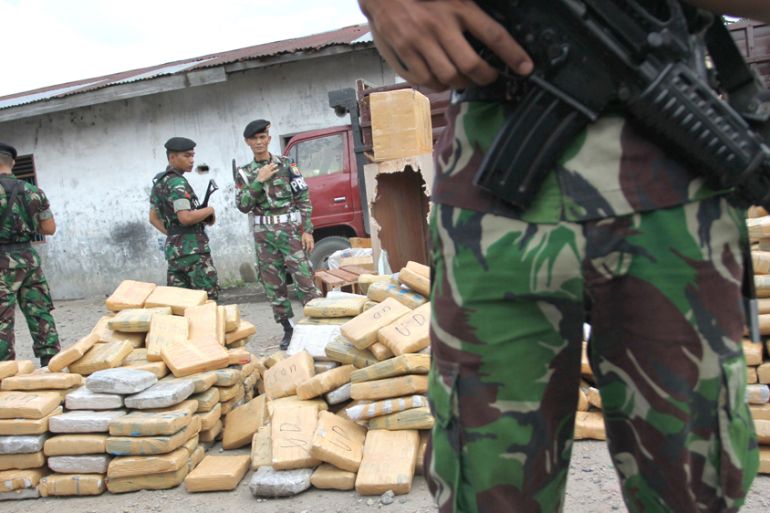Crackdowns and cutbacks: Indonesia’s drug policy
With funding cut for rehab, many of Indonesia’s one million drug addicts are left with herbal and faith-based remedies.

Rizki Mulyadi sits half-submerged in a steaming herbal bath, hands folded in his lap and head down.
The 26-year-old hopes the concoction he is bathing in – and the Islamic teacher who makes it – will help him overcome a six-year addiction to the drug of choice for many in Indonesia: crystal methamphetamine, or “meth”.
Keep reading
list of 4 itemsMasked Tunisian police arrest prominent lawyer for media comments
Gaza’s mass graves: Is the truth being uncovered?
Tunisia: The migration trap
The traditional rehabilitation centre in Purbalingga village on Java island says it has treated hundreds of addicts, such as Mulyadi, with herbal teas and baths, prayer and counselling.
|
|
| Indonesia narcotics trade thrives in prisons |
“There is an urgent need to have a more nuanced conversation about what effective, human rights-compliant treatment entails in Indonesia, and to clearly differentiate between compulsory or mandatory forms of treatment, and truly voluntary, community-based options,” Rick Lines, executive director at UK-based Harm Reduction International, told Al Jazeera.
Indonesian President Joko Widodo says drugs pose a bigger danger than armed groups. He has ordered an intensification of a war on narcotics, including the execution of drug traffickers – the latest last week when three Nigerians and an Indonesian faced a firing squad.
But while raids, arrests and punishments pick up, state funding for rehabilitation, which weans people off drugs and cuts demand, is dwindling.
That leaves thousands of people such as Mulyadi with few affordable options, in a country that within years has gone from being a drug transit point to one of Southeast Asia’s biggest markets for narcotics.
According to government estimations, there are six million drug users in Indonesia, a country of 250 million people. Of those, more than one million are addicted to meth, the UN Office on Drugs and Crime said in a 2013 report.
But less than 1 percent of dependent users got treatment in 2014, compared with a global average of 16 percent, the UN report said.
Prisons, not rehab
Indonesian law mandates rehabilitation for people caught with small quantities of drugs. But many end up in crowded jails.
“Many of those who are in prison should not be sentenced to prison at all, they should be sent to rehab,” said Social Affairs Minister Khofifah Indar Parawansa.
Her ministry aims to rehabilitate 15,000 drug users this year on a budget of 87 billion rupiah ($6.6m). Next year, it will only get funds to help 9,000, she said.
“We need support in terms of budget to be able to rehabilitate all drug users in need,” said Parawansa.
“Our budget alone is not enough for that, it is experiencing a decline.”
But Lines, of Harm Reduction, said the issue is not simply that of a budget.
“Just calling for a redirection of funds away from law enforcement and towards ‘treatment’ without making this distinction, and ensuring only truly voluntary models are supported, does not necessarily benefit people who use drugs,” he told Al Jazeera.
“A redirection of focus and funds away from repressive policies should happen with evidence-based approaches such as harm reduction and community-based drug dependence treatment as the priority, rather than coercive or non-evidence based models,” said Lines.
While rehabilitation funding has been cut, the president has tripled the budget of the national counter-narcotics agency, known as the BNN, to $160,000. It also draws on the police budget.
A spokesman for Widodo, asked about the cut to rehabilitation spending, said many areas were seeing tighter budgets, and it did not mean the president did not value rehabilitation.
“The president is concerned about how to prevent the spread in drug use, and rehab programmes are part of that,” said the spokesman, Johan Budi.
“We need to be hard on smugglers and traffickers, and that explains why the president is taking a hard approach, but that doesn’t mean the war on drugs is at the expense of rehabilitation. Both law enforcement and rehabilitation are happening at the same time.”
Indonesia is not the only country to take a hard line.
President Rodrigo Duterte of the Philippines has also declared a war on drugs – about 300 suspected dealers were shot dead in July, most in vigilante killings, police say.
Thailand has also for years been tough on drugs but its soaring prison population has recently prompted a re-think and the downgrading of meth from a Category 1 drug to reduce numbers in jail.
Critics say Widodo’s stand on drugs criminalises victims and makes the path to recovery that much harder.
“They want to build more prisons but they should be building more rehab centres and making more treatment options available,” said Andreas Harsono, of Human Rights Watch in Jakarta.
The centre in Purbalingga, which relies on herbal remedies and faith to help addicts, is one of 160 such facilities across Indonesia. There are 18 government rehab centres and almost 400 private ones and public clinics using more conventional means.